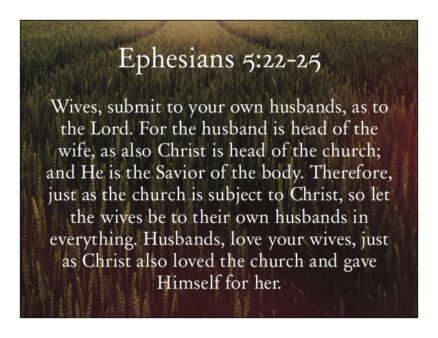A woman’s place in the church and in the home… I’ve had Ephesians 5 quoted at me so many times, and frankly it’s quoted all the harder at those women who are intelligent and capable, not “rebellious” or “unsubmissive.”
I don’t feel comfortable with women pastors. It’s my personal preference; I condemn no one for having a different opinion. However, that’s where my agreement with complimentarianism ends. I don’t disagree with Ephesians 5, but I do disagree with the too frequent misuse of it and a few other verses to condone abuse within Christian homes and communities.
Submission. It’s a term that has been yelled at me, preached at me, a term used to condemn and manipulate me and to relegate me to the sidelines not because I’d done anything wrong, but because I was born with two X chromosomes. Because of how God made me, I’ve been taught that the following were acceptable behaviors toward me and other women:
- physical abuse
- sexual abuse – such as rape of a wife by her husband
- verbal abuse (referring to women as heifers, discussing them as housekeepers, extra income, child bearers and keepers, and objects, but never as people to love and collaborate with)
- child neglect (the man and his desires have precedence over any other person in the household- the wife is to submit and the children to obey)
- stalking (if I didn’t want it, I should have married)
The problem with these is that when this is the “love” demonstrated by the church and “godly” men, when they go on to say that these are acceptable because if the women enduring these things would only submit more (meaning put up, shut up, and take whatever was done to them), God would surely step in and prevent more harm, when these are allowed or ignored, they undermine the rest of the passage in Ephesians, for if Christ loves the church and gave himself for it, if he loves the church truly and completely, but will only stop abuse if the woman accepts it and says nothing, does nothing, and if the husband who does this to her moreover is also supposed to be demonstrating the same love for her as Christ does… then she is doomed, because neither loves her well. She is relegated to the position of slave, with only what value someone else – her abuser, her accuser – places on her.
Consider this: In the church, which happened first, the church’s submission or Jesus’ love? He loved first and he loved well. The church still struggles with submission. If this is the case, then in marriage, if it can be compared to the relationship of Christ to the church, the husband should love without demanding submission in any form. Submission can’t be commanded anyway. If, though, the husband loves well, submission from the wife will come. She will trust the one who loves her more as she learns more about that love.
What is a woman’s “place?” The same as any human’s. Not in some certain hierarchy of worth or lack of worth, not “under” a man, not in a certain role. A woman is not a threat to man that she should be put down or destroyed. She is to be loved. That is her place, and it will not be found in abuse, in hierarchy, or in any relegation to a lesser role than she is capable of. Love promotes growth and encourages the one loved to be all that she can be. It values the person as she is, without demand or expectation, without condition, while still encouraging her to be more than she could expect of herself.












